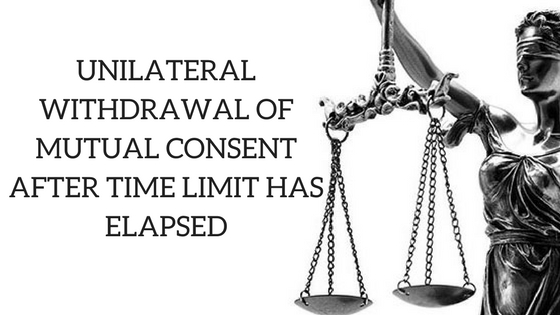Aapka Consultant Judgment Series- In this series, we are providing case analysis of Landmark Judgments of Hon’ble Supreme Court of India.
Ashok Hurra Vs. Rupa Bipin Zaveri with Ashok Hurra Vs. Rupa Ashok Hurra
AIR1997SC1266, (1997)4SCC226
Hon’ble Judges/Coram: K.S. Paripoornan, and M.M. Punchhi, JJ.
Decided On: March 10th, 1997
FACTS:
The marriage between appellant and respondent was solemnized on December 3rd, 1970. Differences cropped up between them and on June 30th, 1983 the wife left the matrimonial home. On August 21st, 1984 a joint petition for divorce was filed under Section 13B of the Hindu Marriage Act, 1955. The parties sought a decree for dissolution of marriage by mutual consent. On April 4th, 1985 the husband alone moved an application praying for passing a decree of divorce. On March 27th, 1986 the wife filed an application withdrawing her consent for divorce. The husband contended that the wife has no right to withdraw or revoke the consent after the period of 18 months, under Section 13B of the Act.
ISSUE:
Whether a decree of divorce be passed if one of the parties withdraws consent before passing of the same?
JUDGMENT:
The Court held that the observations made by the Supreme Court in the matter of Sureshta Devi Vs. Om Prakash that the mutual consent should continue till the divorce decree is passed, even if the petition is not withdrawn by one of the parties within the period of 18 months, appears too wide and does not logically accord with Section 13B(2) of the Act. The paramount consideration should be that a party who comes to the Court with clean hands should be assisted. The Court held that the wife has not withdrawn her consent lawfully given for a period of 18 months and it is not a case where the consent given is revoked on the ground that it is vitiated by fraud or undue influence or mistake etc. Court observed that there is no scope of reconciliation between the parties and marriage has broken down irretrievably. The Court held that appropriate safeguard or provision for the respondent to enable her to have a decent living should be made. The Court held that the respondent should be paid a sum of Rupees 10 lakhs and her cost in litigation, as a condition precedent for the decree to take effect.
HELD:
Decree of divorce for dissolution of marriage by mutual consent passed. A decree for divorce can be passed even if one of the parties withdraws consent before such passing.












